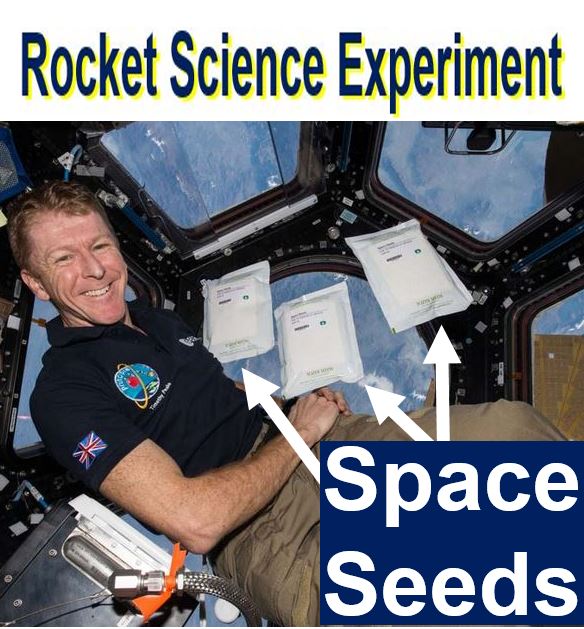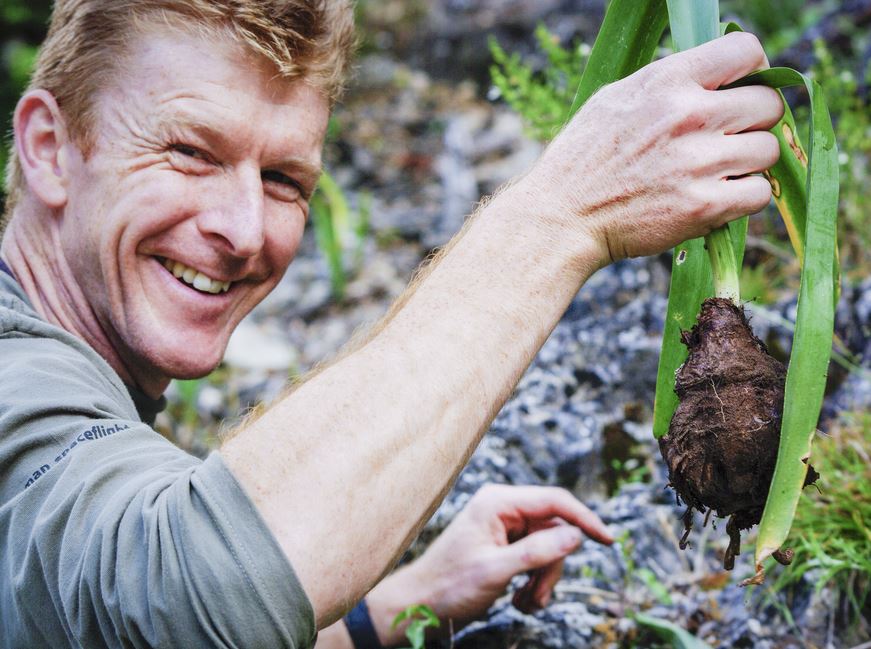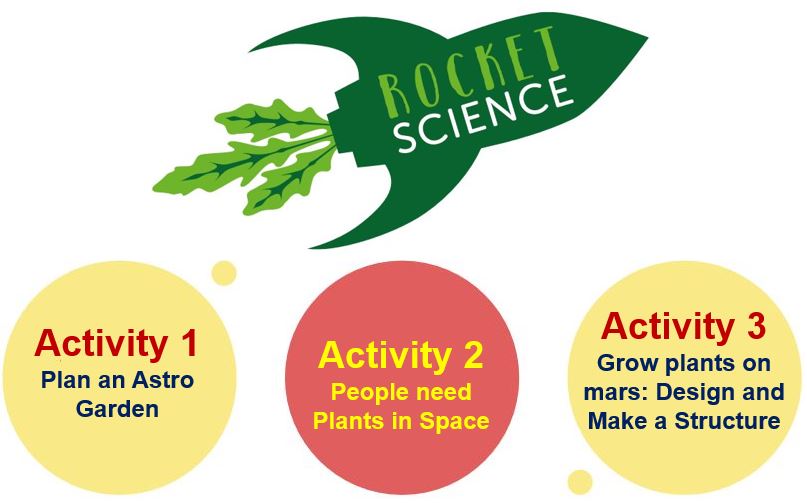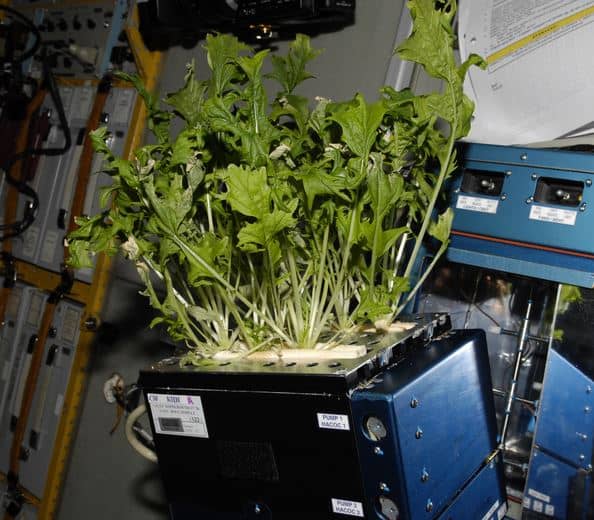Millions of space seeds that have been planted in schools, as part of a joint project with astronaut Tim Peake, have turned hundreds of thousands of British students into rocket scientists, say the British Horticultural Society (BHS) and the UK Space Agency.
The rocket seeds were taken to the International Space Station (ISS) by Major Tim Peake in December 2015. They were later sent back to Earth and distributed to a number of schools across Britain.
The Rocket Science project
Groups of schoolchildren in those selected schools planted the rocket seeds as part of the Rocket Science educational project launched by the UK Space Agency and the RHS Campaign for School Gardening.
 Tim Peake with three batches of space seeds floating in the weightless environment of space. Over 600,000 schoolchildren are helping him in one of the world’s largest ever science experiments – Rocket Science. (Image: schoolgardening.rhs.org.uk)
Tim Peake with three batches of space seeds floating in the weightless environment of space. Over 600,000 schoolchildren are helping him in one of the world’s largest ever science experiments – Rocket Science. (Image: schoolgardening.rhs.org.uk)
On April 18th, Major Peake sent a special message from the ISS – in orbit 400 kilometres (248 miles) from the Earth’s surface – to the hundreds of thousands of schoolchildren who are participating in the project.
Six hundred thousand pupils signed up to project Rocket Science – a giant experiment to determine what the impact of microgravity and space travel might be on seed germination and growth.
Major Peake wished them good luck with their investigations. The results of the project will help scientists across the world form a clearer picture of the potential for astronauts to farm their own food to sustain them on deep space (long-term) missions.
Project’s findings useful for space agencies’ planning
Speaking from orbit, Major Time said regarding Rocket Science:
“This is a really exciting week for the hundreds of thousands of young people across the country who will begin their Rocket Science experiments. I’d like to wish everyone taking part the best of luck with their investigations and I look forward to seeing some of the results.”
 During the Rocket Science mission, 2kg of rocket seeds were sent to the ISS together with Major Time Peake, and then returned to Earth so that thousands of British schools could take part in a nationwide science experiment to compare space seeds to Earth-bound seeds. Each school has received two packets of 100 seeds. (Image: principia.org.uk)
During the Rocket Science mission, 2kg of rocket seeds were sent to the ISS together with Major Time Peake, and then returned to Earth so that thousands of British schools could take part in a nationwide science experiment to compare space seeds to Earth-bound seeds. Each school has received two packets of 100 seeds. (Image: principia.org.uk)
“It’s possible that among those pupils taking part in the project are the young people who will help mankind reach the next big milestones in space exploration for the benefit of people on Earth. I hope the RHS Campaign for School Gardening’s Rocket Science experiment will spark curiosity and wonder amongst young people who may become the next generation of horticultural scientists.”
Over 8,600 schools and educational groups are taking part in the Rocket Science experiment, which is one of the biggest mass experiments ever to be carried out worldwide.
Space vs. Earth-bound seeds
Pupils across the country will spend thirty-five days analysing the growth and development of two batches of rocket seeds that to the naked eye look identical – but they are not.
While the seeds in one batch have never left our planet, those in the other batch spent time in 17,000 mph (27,358 k/ph) orbit around the Earth with Major Peake – in a weightless environment.
 According to principia.org.uk: “In our Rocket Science Primary Resource Pack (there is also a Secondary School Pack) you will find three classroom activities that will help you and your pupils have fun with space, whilst considering the potential for our long term survival there.” (Image: Rocket Science: Primary Schools Resource Pack)
According to principia.org.uk: “In our Rocket Science Primary Resource Pack (there is also a Secondary School Pack) you will find three classroom activities that will help you and your pupils have fun with space, whilst considering the potential for our long term survival there.” (Image: Rocket Science: Primary Schools Resource Pack)
The experiment has two aims:
1. Get young people keen on science and horticulture.
2. Provide ESA (European Space Agency) with key insights into some of the challenges astronauts may face when trying to grow their own food in deep space missions.
The Royal Horticultural Society says it will publish the results of the experiment later this year, and will also provide updates on Facebook and Twitter.
According to principia.org.uk:
“People need plants in space – and plants need people! Plants need all our ingenuity, scientific knowledge and skills to help them survive in really inhospitable conditions. All the things we take for granted on Earth – light, water, soil, gravity and insects for pollination – are either absent or reduced in a space environment.”
“Plants grown on Mars would be subjected to dust storms, freezing temperatures and harsh radiation. So over the last fifty years, space biologists have been finding out ways to compensate for these differences to see how plants could flourish.”
 This Mizuna lettuce grew aboard the International Space Station before being harvested and frozen for return to Earth. (Image: nasa.gov)
This Mizuna lettuce grew aboard the International Space Station before being harvested and frozen for return to Earth. (Image: nasa.gov)
American space agency NASA quotes Shane Topham, an engineer with Space Dynamics Laboratory at Utah State University in Logan, who said regarding growing food in space:
“Growing food to supplement and minimize the food that must be carried to space will be increasingly important on long-duration missions. We also are learning about the psychological benefits of growing plants in space – something that will become more important as crews travel farther from Earth.”
“I don’t see future space crews leaving the Earth for long durations without having the ability to grow their own food. The knowledge that we are gaining is enabling us to extend our exploration and future colonization of space.”
In an interview with Rochdale Online, St Cuthbert’s RC High School, Science Teacher Miss Jackson said:
“We are very excited to be taking part in Rocket Science. This experiment is a fantastic way of teaching our students to think more scientifically and share their findings with the whole school.”
Headteacher of St. Aidan’s CE Primary School in Billinge, Merseyside, Melanie Ravenscroft said in an interview with St. Helens Star:
“We are very excited to be taking part in Rocket Science. This experiment is a fantastic way of teaching our pupils to think more scientifically and share their findings with the whole country.”
“It also gives the students a chance to show their excellent gardening skills and help further scientific discoveries.”
Video – Special Rocket Science message from Tim Peake
This Royal Horticultural Society video was published on 29th January, while the 2kg of seeds were still in space. You can hear Major Peake on board the ISS calling on schools across the UK to help him in this important experiment.
